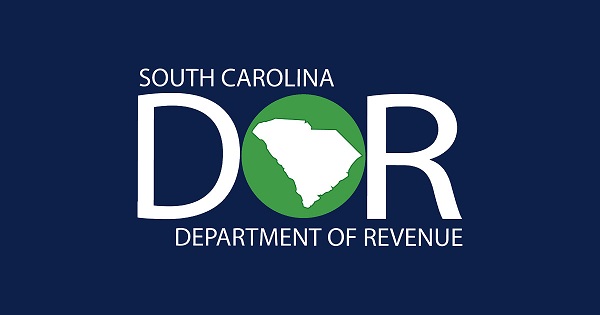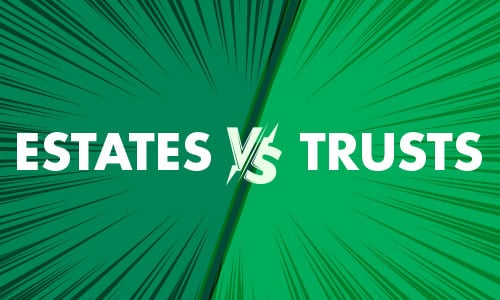Explore web search results related to this domain and discover relevant information.
This post may contain links from advertisers, and we may receive compensation for marketing their products or services or if users purchase products or services. | Marketing Disclosure ... Trusts and estates are the two main legal structures for transferring assets to your heirs and beneficiaries.
An estate is everything that you own when you die. This does not include anything held jointly with someone else. Nor does it include anything that you have transferred or otherwise assigned by the time you die.One of the most common misunderstandings regarding an estate is how much control someone has over the terms of his or her will. While state law governs who inherits when someone dies intestate, most states have very few restrictions on how an executor can distribute assets through a will.Estate taxes are assessed based on how much an heir has received, and they require a high level of wealth. In general, for an individual, estate taxes do not apply in 2025 unless you have inherited more than $13.99 million ($28.98 million for a couple filing jointly). This includes not only cash but also the value of any property or other assets.It’s also important to understand that heirs themselves do not pay estate taxes when they inherit property. If the estate is large enough to owe taxes, those amounts are paid directly from the estate before any distributions are made, and any administrative or management costs are also covered by the estate.
In keeping with the security objectives of the SCDOR, the following browsers are currently supported by our website: · South Carolina has no estate tax for decedents dying on or after January 1, 2005


An estate plan guides your loved ones in handling your financial affairs and medical care. If you have a spouse, minor children, or family members with special needs, your estate plan should provide for their care and financial support if you are incapacitated or after you have gone.
Most estate planning attorneys will tell you that a last will and testament is the foundation of any good estate plan. The document sets out your wishes for distributing your property after you die and who will care for your minor children. The individuals or organizations receiving your assets under the terms of the will are your “beneficiaries.”Essentially, a will is a set of instructions the estate’s executor or the personal representative responsible follows to administer your estate. The executor should be someone you trust to carry out the will’s instructions and manage your assets until they can distribute them to your beneficiaries.These are sometimes called “advanced medical directives” and usually state your wishes concerning life support or other life-sustaining interventions if you cannot decide for yourself. A health care power of attorney lets you give another person legal authority to make crucial decisions regarding your medical care. In most cases, the named individual has a durable medical power of attorney so that person can continue making medical decisions if you have become incapacitated. Most states assume that health care power of attorney is durable, but the estate plan should clarify this issue.The person or organization establishing the trust is known as the “grantor.” The purpose of the trust is to protect the grantor’s assets by moving them to an independent trust entity and provide for distribution to the trust’s beneficiaries. The trustee is responsible for acting in the best interests of the beneficiaries and operating the trust in a manner consistent with the trust agreement. Trusts are often used in estate planning because they reduce estate taxes, avoid the time and expense of probate proceedings, and govern the distribution of assets to beneficiaries.

The U.S. is one of many countries that levies taxes on estates or inheritances. Of all America’s taxes, the estate tax is perhaps the most contentious.
Not to be confused with estate taxes, which are paid by the decedent’s estate based on the size of the total estate before assets are distributed, inheritance taxes are paid by the recipient or heir based on the value of the bequest received. rate in the OECD at 40 percent; the world’s highest rate, 55 percent, is in Japan, followed by South Korea (50 percent) and France (45 percent).The U.S. estate taxAn estate tax is imposed on the net value of an individual’s taxable estate, after any exclusions or credits, at the time of death. The tax is paid by the estate itself before assets are distributed to heirs.U.S. estate taxA tax is a mandatory payment or charge collected by local, state, and national governments from individuals or businesses to cover the costs of general government services, goods, and activities.As estate taxes become narrow-based, meager revenue sources with high administrative costs, repeal becomes a strong option. Thirteen countries or jurisdictions have repealed their estate or inheritance taxes since 2000.

To understand “What is an estate?”, you’ll first need to understand how the term ‘estate’ fits into the broader picture of Trust and Estate law. In Trust and Estate Law, ‘estate’ refers to all of the property (both real and personal) that an individual owns, or has a controlling ...
To understand “What is an estate?”, you’ll first need to understand how the term ‘estate’ fits into the broader picture of Trust and Estate law. In Trust and Estate Law, ‘estate’ refers to all of the property (both real and personal) that an individual owns, or has a controlling interest in, at any given point of time in their life and at the time of their death.While a gross estate includes all assets owned at the time of death for the person who passed away (the ‘decedent’), only certain assets are part of the decedent’s probate estate. Estate assets that are subject to probate are called probate assets, and assets in an estate that are not subject to probate are called non-probate assets. Non-probate assets either transfer by operation of law or through a Trust.Some examples of non-probate assets that transfer by operation of law are a life insurance policy with a designated beneficiary or a parcel of real property titled jointly with a right of survivorship. Similarly, if the decedent created a Living Trust and transferred ownership of assets that may been subject to probate to the Trust, then those assets are also part of the gross estate, but not part of the probate estate.In estate planning, one must carefully plan for the smooth transfer of real property to beneficiaries, whether through a Will, a Trust, or other legal mechanisms. Due to factors such as mortgages and property taxes, the transfer of ownership of real property can be more complex than that of personal property.
In common law, an estate is a living or deceased person's net worth. It is the sum of a person's assets, meaning their the legal rights, interests, and entitlements to property of any kind, minus all their liabilities at a given time. The issue is of special legal significance on a question ...
In common law, an estate is a living or deceased person's net worth. It is the sum of a person's assets, meaning their the legal rights, interests, and entitlements to property of any kind, minus all their liabilities at a given time. The issue is of special legal significance on a question of bankruptcy and death of the person.Under United States bankruptcy law, a person's estate consists of all assets or property of any kind available for distribution to creditors. However, some assets are recognized as exempt to allow a person significant resources to restart their financial life.In land law, the term "estate" is a remnant of the English feudal system, which created a complex hierarchy of estates and interests in land. The allodial or fee simple interest is the most complete ownership that one can have of property in the common law system.An estate can be an estate for years, an estate at will, a life estate (extinguishing at the death of the holder), an estate pur autre vie (a life interest for the life of another person) or a fee tail estate (to the heirs of one's body) or some more limited kind of heir (e.g.Estate in land can also be divided into estates of inheritance and other estates that are not of inheritance. The fee simple estate and the fee tail estate are estates of inheritance; they pass to the owner's heirs by operation of law, either without restrictions (in the case of fee simple), or with restrictions (in the case of fee tail).

An estate sale is a sale, liquidation or auction of someone's personal property after they die or downsize. The proceeds may cover debts or other expenses.
This may influence which products we review and write about (and where those products appear on the site), but it in no way affects our recommendations or advice, which are grounded in thousands of hours of research. Our partners cannot pay us to guarantee favorable reviews of their products or services. Here is a list of our partners. An estate sale involves selling most of a person’s personal belongings rather than just unneeded items.Tina Orem is an editor and content strategist at NerdWallet. Prior to becoming an editor and content strategist, she covered small business and taxes at NerdWallet. She has a degree in finance, as well as a master's degree in journalism and an MBA. Previously, she was a financial analyst and director of finance at public and private companies. Tina's work has appeared in a variety of local and national media outlets. ... An estate sale is a sale, liquidation or auction of someone's personal property after the person dies or decides to downsize.The proceeds may cover debts, nursing home costs, burial fees or other expenses. If the owner has died, leftover proceeds or items may go to beneficiaries. People often put instructions in their wills about what to do with these leftover items and proceeds (called a residuary estate).Pricing estate sale items can be a challenge, and if you don't sell everything, you may have to hold another estate sale, donate the items, give them away to friends and family or throw them away at a local dump.
Probate is simply the legal process ... or heirs. The probate process does involve interacting with the courts, but if you have a properly drafted will, then the process is mostly administrative, and most people can handle probate matters themselves. I have limited my law practice to planning estates...
Probate is simply the legal process of getting assets from the deceased individual to the named beneficiaries or heirs. The probate process does involve interacting with the courts, but if you have a properly drafted will, then the process is mostly administrative, and most people can handle probate matters themselves. I have limited my law practice to planning estates.Instead, the directions I give to my clients can get them started on the path to carrying out an estate plan. Or, if someone cannot handle administering an estate plan, I will refer them to my friends who handle probate and other estate administration matters.Sometimes my clients, or my client’s children, seem to confuse estate planning vs. estate administration. The estate planning process is how we set up a will or trust that contains instructions on what should happen to your assets after you pass away. The administration process is carrying out the instructions after you have passed away.And just because an estate plan in place does not mean everything dictated in the estate plan will automatically happen. I don’t really use the word “automatic” in estate planning, as transfers of assets or other property tend not to be automatic when someone dies.

A lock () or https:// means you've safely connected to the .gov website. Share sensitive information only on official, secure websites. ... INFORMATION FOR... ... The estate tax is a tax on your right to transfer property at your death.
It consists of an accounting of everything you own or have certain interests in at the date of death. Find some of the more common questions dealing with basic estate tax issues.If you give someone money or property during your life, you may be subject to federal gift tax. Find some of the more common questions dealing with gift tax issues as well as some examples of how different types of gifts are treated. Learn when to file estate and gift taxes, where to send your returns, and get contact information if you need help.Find common gift and estate tax questions, including when these taxes apply and when they do not.Stay up to date with the tax law changes related to estate and gift taxes.

When someone passes away, their “estate” includes all the assets and liabilities that were in their name during their lifetime. The executor, often a family member, is responsible for initiating the probate process. Anything that is individually owned by or...
When someone passes away, their “estate” includes all the assets and liabilities that were in their name during their lifetime. The executor, often a family member, is responsible for initiating the probate process. Anything that is individually owned by or titled in only the name of the deceased person becomes part of the probate estate and must go through probate court.For property that doesn’t have a deed or title, it is property that the decedent owned personally. Life insurance policies are considered non-probate assets that automatically transfer to beneficiaries upon the policyholder’s death. Unless the policy does not have a beneficiary. Estate management is the process of handling a deceased person’s estate, which includes all their assets, debts, and property.When a person dies, their estate must go through the probate process, which involves distributing their assets according to their will or the laws of the state. The probate court oversees the probate process to ensure that the deceased person’s wishes are carried out and their assets are distributed fairly.Business interests, whether owned individually or owned with other shareholders. ... Creditors have a limited time to file claims against the deceased’s estate to recover what they are owed.
An estate sale, also referred to as a tag sale, is a method of liquidating the belongings of a family or estate. Here's how it works.
This post may contain links from advertisers, and we may receive compensation for marketing their products or services or if users purchase products or services. | Marketing Disclosure ... While “estate sale” might sound like a phrase used in high society, it’s simply a large, organized sale of someone’s possessions, typically held after they’ve passed away or moved.Unlike your typical garage or yard sale, an estate sale is far more extensive, often covering the entire contents of a household. This might be necessary to pay off the deceased’s debts or to distribute their assets among their heirs.For starters, the nature of the items sold is often vastly different. Estate sales often involve selling off an entire home’s worth of items, including high-value items. On the other hand, garage sales typically involve the sale of everyday items like used clothing or outdated electronics.The organization and pricing methods for estate sales vs. garage sales also differ significantly. Estate sales are usually organized by professional estate sale companies who price items based on their market value.
More complex issues to consider include managing your financial needs in the event of incapacity and the transfer of your assets after you and/or your spouse pass away. Understanding the differences between a trust and an estate—and the expertise and services necessary for establishing and ...
More complex issues to consider include managing your financial needs in the event of incapacity and the transfer of your assets after you and/or your spouse pass away. Understanding the differences between a trust and an estate—and the expertise and services necessary for establishing and administering each—is critically important for optimizing wealth management.An estate is managed by an executor, also called a personal representative, who is nominated by you in your Last Will and Testament to administer and transfer assets under court supervision. A trust is a legal document that expresses your wishes even through incapacity or death and serves as the trustee’s roadmap for administering and transferring wealth.A trustee, nominated by you in your trust, is responsible for carrying out fiduciary duties, one of which is distributing your assets as set forth in your trust to the individuals, entities (such as another trust), and/or charitable organizations you name as beneficiaries. A trust is just one component of a comprehensive estate plan that complements other planning tools.All documents relating to the probate of your estate, including the terms of your will, are public and subject to inspection by anyone who wishes to look at them. A typical probate estate is finalized somewhere between 9 and 12 months; or longer if a contest or litigation is filed.


The term estate may also be used to describe an individual’s net worth. Fundamentally, an estate is the total of a person’s assets, less any liabilities or debts. The value of a personal estate may become relevant if an individual declares bankruptcy. In these instances, the estate is assessed ...
The term estate may also be used to describe an individual’s net worth. Fundamentally, an estate is the total of a person’s assets, less any liabilities or debts. The value of a personal estate may become relevant if an individual declares bankruptcy. In these instances, the estate is assessed to determine which debts can be paid.Aside from bankruptcy, the value of an estate is often determined upon the individual’s death, which is why estate planning is crucial. Upon death, the assets encompassed within an estate must be distributed to beneficiaries or heirs.Everyone has an estate – no matter how large or small it may be. Without an estate plan, a probate court will handle the transfer of assets, which can be difficult, expensive, and emotionally exhausting for the decedent’s loved ones. The state of California allows some estates to go through a simplified probate process for estates valued at less than $150,000 (adjusted every year for inflation).The executor must file a final report with the probate court on all income received and payments made by the estate. The remaining assets are divided among beneficiaries named in the will if one exists. If there is no will or estate plan in place, the probate court will determine who will inherit assets based upon intestate succession laws.

More complex issues to consider include managing your financial needs in the event of incapacity and the transfer of your assets after you and/or your spouse pass away. Understanding the differences between a trust and an estate—and the expertise and services necessary for establishing and ...
More complex issues to consider include managing your financial needs in the event of incapacity and the transfer of your assets after you and/or your spouse pass away. Understanding the differences between a trust and an estate—and the expertise and services necessary for establishing and administering each—is critically important for optimizing wealth management.An estate is managed by an executor, also called a personal representative, who is nominated by you in your Last Will and Testament to administer and transfer assets under court supervision. A trust is a legal document that expresses your wishes even through incapacity or death and serves as the trustee’s roadmap for administering and transferring wealth.A trustee, nominated by you in your trust, is responsible for carrying out fiduciary duties, one of which is distributing your assets as set forth in your trust to the individuals, entities (such as another trust), and/or charitable organizations you name as beneficiaries. A trust is just one component of a comprehensive estate plan that complements other planning tools.All documents relating to the probate of your estate, including the terms of your will, are public and subject to inspection by anyone who wishes to look at them. A typical probate estate is finalized somewhere between 9 and 12 months; or longer if a contest or litigation is filed.
This post may contain links from advertisers, and we may receive compensation for marketing their products or services or if users purchase products or services. | Marketing Disclosure ... Trusts and estates are the two main legal structures for transferring assets to your heirs and beneficiaries.
An estate is everything that you own when you die. This does not include anything held jointly with someone else. Nor does it include anything that you have transferred or otherwise assigned by the time you die.One of the most common misunderstandings regarding an estate is how much control someone has over the terms of his or her will. While state law governs who inherits when someone dies intestate, most states have very few restrictions on how an executor can distribute assets through a will.Estate taxes are assessed based on how much an heir has received, and they require a high level of wealth. In general, for an individual, estate taxes do not apply in 2025 unless you have inherited more than $13.99 million ($28.98 million for a couple filing jointly). This includes not only cash but also the value of any property or other assets.It’s also important to understand that heirs themselves do not pay estate taxes when they inherit property. If the estate is large enough to owe taxes, those amounts are paid directly from the estate before any distributions are made, and any administrative or management costs are also covered by the estate.

The leading estate sale marketplace. Search for local estate sales, shop online and connect with local estate sale companies.
Local estate sales delivered to your inbox Sign me up! ... Bid Now at: https://elite-collectibles.com... Live Bidding Starts Every Tuesday at 6 PM CST (4 PM PST · 5 PM MST · 7 PM EST) Shipping & Handling *Combined Shipping on all orders!"I love EstateSales.org!BuyBrowse, shop, and bid on itemsSellAdvertise your estate sale or auction companyHave an existing account?Browse and bid on items from online estate sales and auctions.

This guide was designed to teach you everything you need to know about the Estate vs Trust discussion, including: ... A Trust is a fiduciary arrangement made between a trustee (usually a person or organization) and a grantor (someone looking to transfer their ownership of assets) on behalf ...
This guide was designed to teach you everything you need to know about the Estate vs Trust discussion, including: ... A Trust is a fiduciary arrangement made between a trustee (usually a person or organization) and a grantor (someone looking to transfer their ownership of assets) on behalf of beneficiaries (a neutral person set to receive the grantor’s assets).Estates include all of the assets and entitlements someone owns or has a controlling interest in at the time of their death. Conversely, an Estate may not include any assets that are jointly held with another person or entity, nor does it account for anything that was transferred or assigned by the time of passing.Liabilities: One of the biggest limiting factors of an Estate, or at least its worth, is existing financial obligations. More commonly referred to as debts or liabilities, existing financial obligations are legally required to be paid by the Estate. Any outstanding debts must be paid by the Estate before any assets can be distributed.As the probate process is unfolding, beneficiaries may not have access to the assets held by the Estate, limiting interaction and distribution. Legal hurdles: In the event a beneficiary or other party challenges the validity of the Will or anything associated with the probate process, litigation may increase the duration and legal fees.

If you already have the right or have probate (as an executor or administrator) you can start dealing with the estate. You may need to apply for the right to deal with the estate of the person who's died (also called 'probate').
You might need to apply for probate before you can deal with the property, money and possessions (the ‘estate’) of the person who died. ... Pay any debts or taxes owed by the person who's died.As a personal representative (an executor or administrator) you’re legally responsible for the money, property and possessions of the person who died (the ‘estate’s assets’).You can get professional legal advice and help, such as from a solicitor, to deal with any estate. You should consider this if the estate has a lot of assets or includes things like trusts.You can then distribute the estate as set out in the will or the law.
A lock () or https:// means you've safely connected to the .gov website. Share sensitive information only on official, secure websites. ... INFORMATION FOR... ... If your Form 706 package was returned to you, you must take specific action to ensure your package is considered timely filed. Below are some of the more common questions and answers about estate ...
A lock () or https:// means you've safely connected to the .gov website. Share sensitive information only on official, secure websites. ... INFORMATION FOR... ... If your Form 706 package was returned to you, you must take specific action to ensure your package is considered timely filed. Below are some of the more common questions and answers about estate tax issues.You may also find additional information in Publication 559 or some of the other forms and publications offered in our forms and publications page. Included in this area are the instructions to Forms 706 and 709. Within these instructions, you will find the tax rate schedules to the related returns. If the answers to your questions cannot be found in these resources, we strongly recommend visiting with a tax practitioner. An estate tax return (Form 706) must be filed if the gross estate of the decedent (who is a U.S.An estate tax return may need to be filed for a decedent who was a nonresident and not a U.S. citizen if the decedent had U.S.-situated assets. Refer to some nonresidents with U.S. assets must file estate tax returns to learn more. File another Form 706 or Form 706-NA, as applicableIn order to elect portability of the decedent's unused exclusion amount (deceased spousal unused exclusion (DSUE) amount) for the benefit of the surviving spouse, the estate's representative must file an estate tax return (Form 706) and the return must be filed timely.
Location: Los Angeles, CA My grandma recently died and I am the trustee of her (now irrevocable trust.) She never proceeded with opening a trust bank…
The estate pays any debts owed by the decedent, and distributes the balance of the estate's assets to the beneficiaries of the estate. ... A trust is a legal entity that is created under state law and is taxed under federal law. The trust can be created to perform one act or a series of acts.An irrevocable trust is a trust in which the grantor has no control of the trust (trust cannot be repealed or annulled) and the trust will be responsible for reporting income on Form 1041 (U.S. Income Tax Return for Estates and Trusts).If you disclaim, then the house goes to the next beneficiary, which I assume would be the estate. Then if you are the court-appointed executor or estate representative, you can sell the house with an executor’s deed.That’s assuming that close relatives live in the houses, that you don’t rent them out to stranger, or otherwise turn the house into a business. ... You would need to choose the trust option. If there is a probate to handle other assets, then you choose the estate option.





